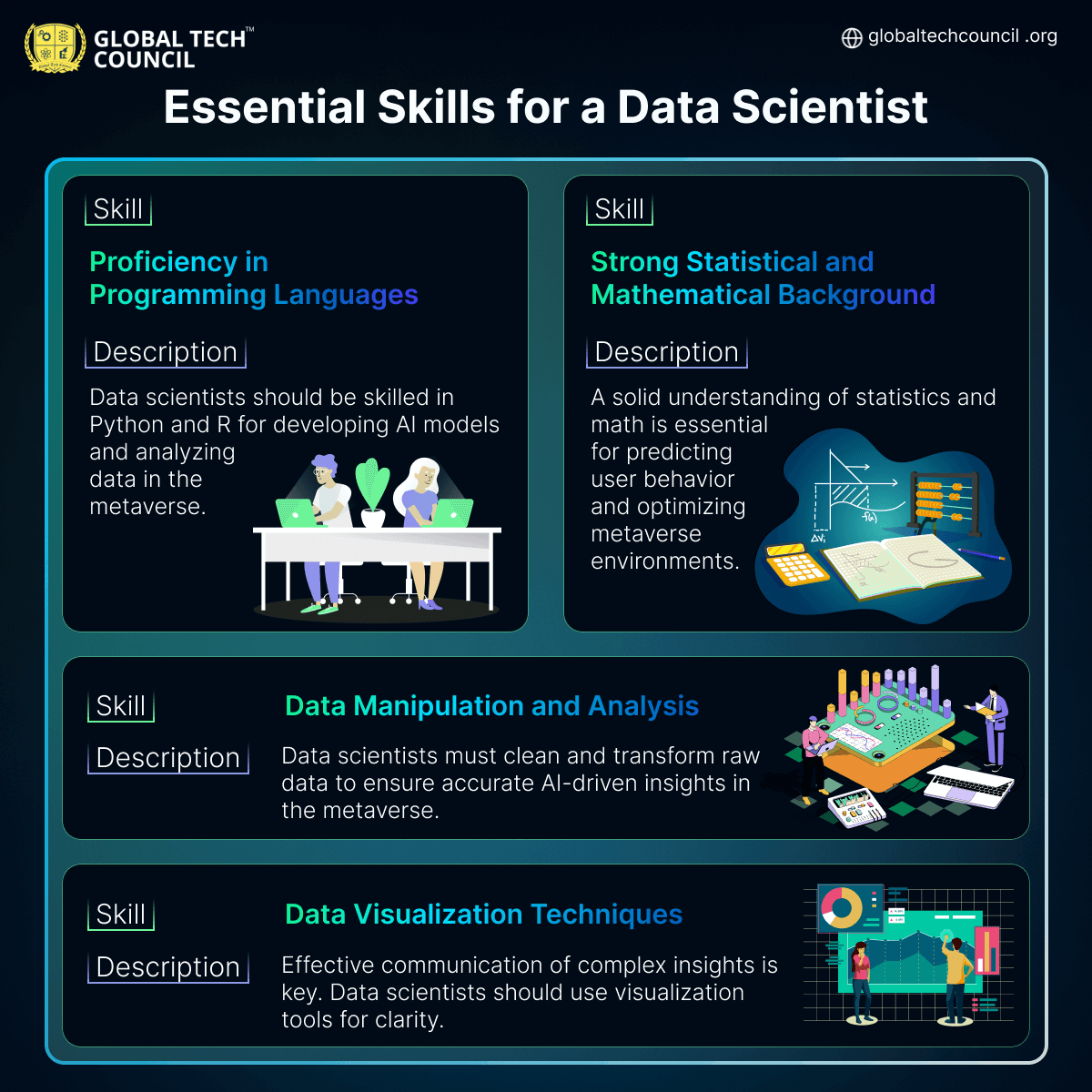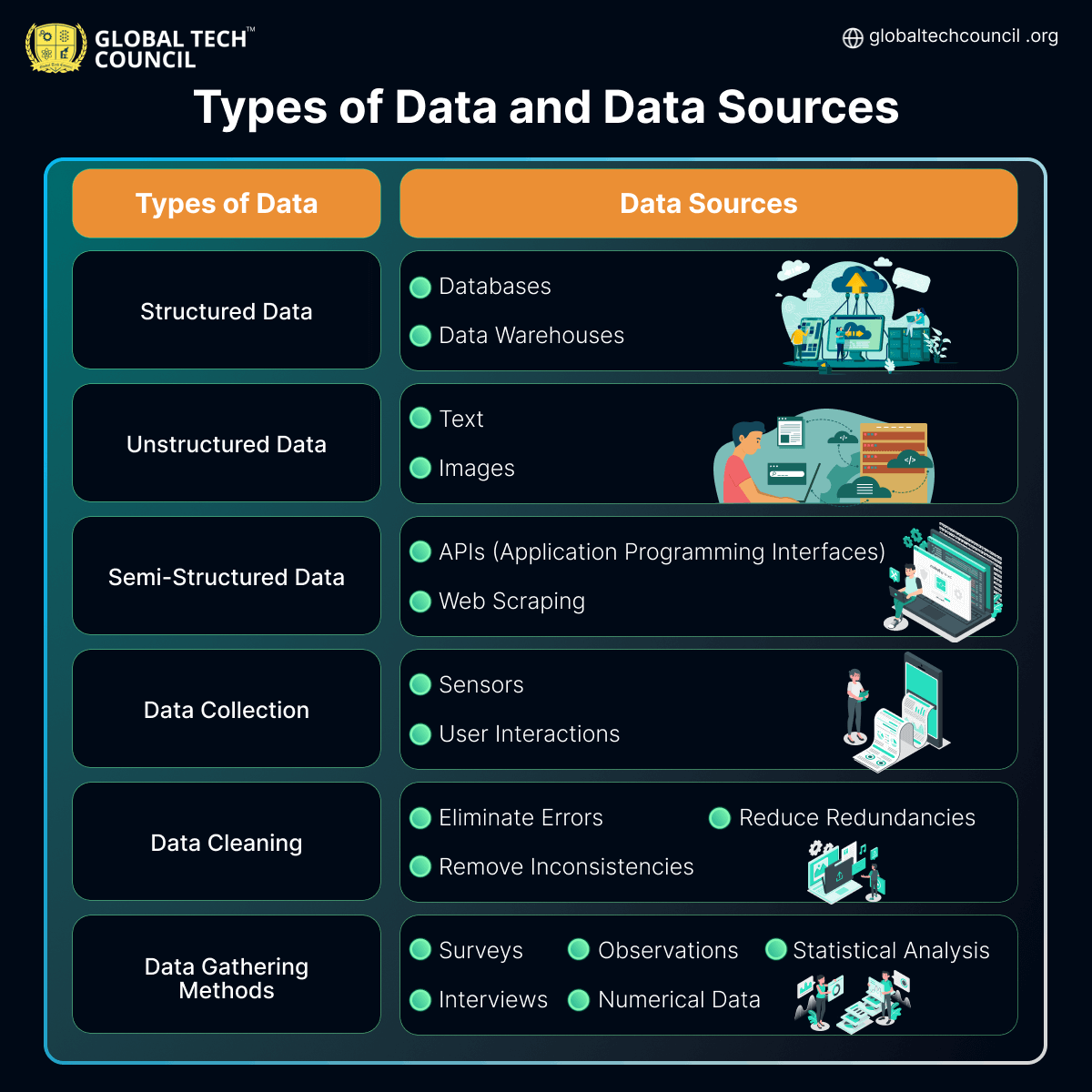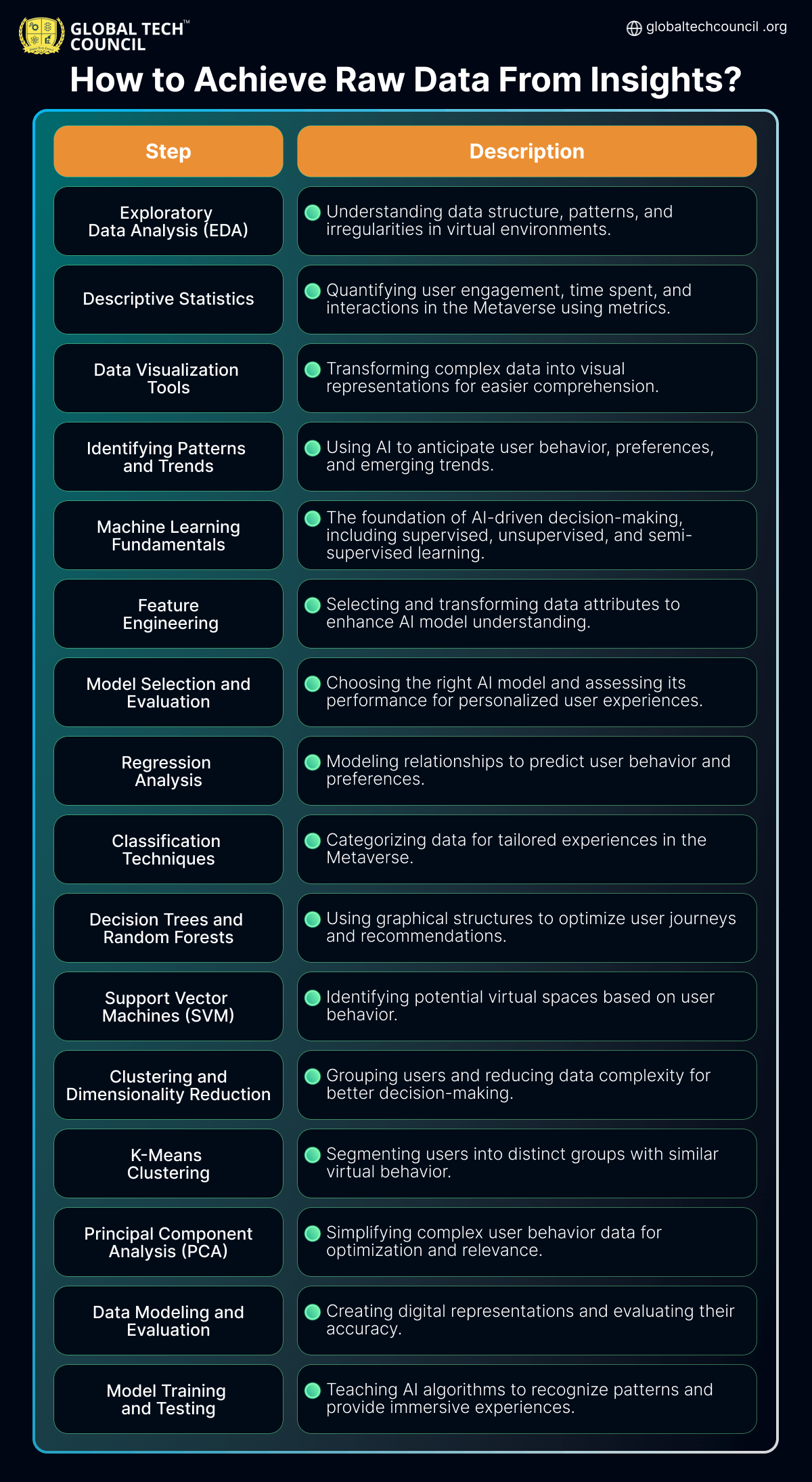Summary:
- The role of a data scientist in the data-driven world is crucial for turning data into insights and innovation.
- Data scientists play a key role in decoding patterns and behaviors in the metaverse, aiding its growth.
- The demand for data scientists has risen significantly with the growth of the metaverse, and they actively shape its landscape.
- Data scientists are essential in handling data streams in the metaverse, where AI algorithms process data to create immersive experiences.
- Data scientists need a diverse skill set, including proficiency in Python and R, strong statistical and mathematical knowledge, data manipulation skills, and data visualization abilities.
- Various educational pathways, such as degrees in computer science or online courses and certifications, can help aspiring data scientists acquire the necessary knowledge and qualifications.
- Navigating the data landscape is vital, including understanding types of data, data sources, collection methods, data cleaning, and ensuring data quality.
- From raw data to insights, data scientists perform tasks like exploratory data analysis, descriptive statistics, data visualization, machine learning, and big data processing.
- To land a data scientist job, one should build skills in programming, machine learning, statistics, data wrangling, data visualization, and gain domain knowledge.
Introduction
In the modern world driven by data, the role of a data scientist has emerged as one of the most sought-after and impactful positions across industries. Data scientists are instrumental in turning raw data into valuable insights, aiding decision-making processes, and driving innovation. This article will guide you through the essential steps to become a proficient data scientist, covering key skills, educational pathways, and practical tips for success in this dynamic field.
Understanding the Role of a Data Scientist
At the heart of the metaverse’s growth lies the role of a data scientist. Data scientists are the architects of the metaverse, utilizing their expertise to derive meaningful insights from vast datasets that power this digital realm. They are the individuals responsible for deciphering the patterns, trends, and behaviors that allow the metaverse to adapt and flourish.
The Growing Demand for Data Scientists
With the exponential growth of the metaverse, the demand for skilled data scientists has soared. Organizations and entities operating within the metaverse require professionals who can navigate the complex landscape of data, AI algorithms, and user behavior. These data scientists are not just passive observers; they are the ones who actively shape the metaverse’s landscape.
Building the Foundation
Before delving deeper into the skills required for data scientists, it’s crucial to understand the foundational aspects. The metaverse is a multifaceted ecosystem that thrives on data streams generated by user interactions, virtual environments, and digital transactions. AI algorithms process this data to create immersive experiences, and data scientists are the linchpin in this process.
Essential Skills for a Data Scientist
For data scientists to excel in their roles within the metaverse, a diverse skill set is paramount.

Educational Background and Qualifications
Becoming a proficient data scientist often involves pursuing relevant educational pathways and acquiring qualifications that enhance expertise.
1. Degrees in Computer Science, Mathematics, or Related Fields
Many data scientists hold degrees in computer science, mathematics, or related disciplines. These degrees provide the necessary theoretical foundation to understand algorithms, data structures, and mathematical principles that underlie AI technologies.
2. Online Courses and Certifications
The digital age offers a wealth of online courses and certifications focused on data science. These resources by reputed institutions like the Global Tech Council cover a range of topics, from machine learning to data visualization, enabling aspiring data scientists to upskill and stay current with industry trends.
3. Bootcamps and Data Science Schools
Intensive data science bootcamps and specialized schools provide immersive learning experiences. These programs often focus on practical skills, enabling participants to swiftly transition into data science roles within the metaverse.
As the metaverse continues to expand, data scientists will remain pivotal figures in shaping its trajectory. From programming and statistics to education and qualifications, these professionals are at the forefront of fusing AI and the metaverse, ushering in a new era of digital interaction and innovation. The subsequent sections of this article will explore how AI-driven applications influence the metaverse’s growth, from virtual economies to personalized experiences.
Navigating the Data Landscape
In the realm of Artificial Intelligence (AI) and the Metaverse, data plays a paramount role. The synergy between AI and the Metaverse is driving transformative changes across various industries. At the heart of this revolution lies the meticulous handling of data. Navigating the data landscape is a critical step in harnessing the power of AI to fuel the growth of the Metaverse.
Types of Data and Data Sources

Dealing with Missing and Incomplete Data
In reality, data might be incomplete or have missing values. AI algorithms depend on complete data for accurate analysis. Imputation techniques can be applied to fill in missing values using statistical methods. However, it’s crucial to choose the right imputation strategy, as inaccurate filling can lead to biased outcomes.
Ensuring Data Quality and Consistency
The quality and consistency of data directly impact AI’s performance and outcomes. Data quality assurance involves validating data against predefined criteria, ensuring it meets accuracy standards. Consistency ensures that data remains uniform across different sources and time periods. These efforts collectively enhance the reliability of AI-driven decisions.
From Raw Data to Insights

Big Data and Cloud Computing
Big data refers to large and complex sets of data that are difficult to process using traditional data management tools. These datasets are characterized by their volume, velocity, variety, and veracity. Big data has become a crucial resource for various industries, including Artificial Intelligence (AI), as it provides insights that can lead to better decision-making.
Hadoop and MapReduce
Hadoop is an open-source framework designed to process and store vast amounts of data across clusters of commodity hardware. MapReduce is a programming model within Hadoop that allows for parallel processing of large datasets. These technologies enable organizations to efficiently manage and analyze big data, which is essential for training and optimizing AI models.
Cloud Platforms for Data Science
Cloud computing has revolutionized the way businesses handle data and AI tasks. Cloud platforms like Amazon Web Services (AWS), Microsoft Azure, and Google Cloud provide scalable and flexible environments for data storage, processing, and AI model training. This eliminates the need for extensive on-premises infrastructure and accelerates AI development.
Deploying Models to Production
Once AI models are trained, they need to be deployed into production environments to provide value. Deploying models involves making them accessible for real-time use, which is a critical step in integrating AI into applications.
Model Deployment Strategies There are various strategies for deploying AI models, including batch processing, real-time inference, and edge deployment. Batch processing involves running predictions on batches of data, real-time inference allows for instant predictions, and edge deployment involves deploying models on devices like smartphones or IoT devices.
APIs and Microservices
APIs (Application Programming Interfaces) and microservices play a significant role in integrating AI models into applications. APIs allow different software components to communicate with each other, while microservices architecture enables the development of applications as a collection of loosely coupled services. This modular approach makes it easier to update and maintain AI functionalities.
Containerization with Docker
Docker is a platform that enables developers to package applications and their dependencies into containers. Containerization ensures consistency across different environments and simplifies the deployment process. AI models can be containerized, making it easier to deploy them across various platforms.
Monitoring and Maintenance
After deploying AI models, continuous monitoring and maintenance are essential. Monitoring ensures that the models are performing as expected and helps detect any issues promptly. Regular maintenance involves updates, patches, and optimizations to keep the AI models running efficiently.
Ensuring Model Performance
AI models’ performance can degrade over time due to changing data distributions or external factors. Monitoring model performance and implementing techniques like transfer learning can help maintain optimal performance over extended periods.
Landing Your Dream Job
Finding a job as a data scientist requires a strategic approach. Follow these steps to increase your chances of landing your dream job:
- Develop Your Skills: Start by building a strong foundation in programming languages like Python and R. Gain proficiency in data manipulation, analysis, and visualization libraries such as NumPy, Pandas, and Matplotlib.
- Learn Machine Learning: Understand the basics of machine learning algorithms and techniques. Learn about supervised and unsupervised learning, regression, classification, clustering, and more. Libraries like scikit-learn will be your allies.
- Statistics and Probability: Data science heavily relies on statistics and probability. Brush up on concepts like hypothesis testing, distributions, and sampling techniques. This knowledge is vital for making informed decisions based on data.
- Data Wrangling: Real-world data is often messy. Learn how to clean and preprocess data effectively. Skills in data wrangling using tools like Pandas will set you apart.
- Data Visualization: Learn to create compelling visualizations that communicate insights effectively. Libraries like Matplotlib, Seaborn, and Plotly can help you create informative graphs and charts.
- Big Data Tools: Familiarize yourself with big data technologies like Hadoop and Spark. These tools are essential for handling and processing large datasets efficiently.
- Domain Knowledge: Gain expertise in a specific domain or industry. This will help you understand the context of the data you’re working with and make more meaningful analyses.
- Build a Portfolio: Create projects to showcase your skills. A portfolio with real-world examples demonstrates your practical abilities to potential employers.
- Networking: Attend data science meetups, conferences, and online forums. Networking can lead to valuable connections and job opportunities.
- Internships and Freelance Work: Consider internships or freelance projects to gain hands-on experience. These opportunities can be stepping stones to a full-time role.
- Customize Your Applications: Tailor your resume and cover letter to each job application. Highlight relevant skills and experiences that match the job description.
Conclusion
Becoming a data scientist is a rewarding journey that requires a blend of technical skills, domain knowledge, and a passion for extracting insights from data. By mastering programming, statistics, machine learning, and data visualization, and by continuously learning and applying your skills, you can contribute significantly to businesses, research, and innovation in today’s data-driven world. Remember, the path to becoming a data scientist is as much about the journey as it is about the destination.
FAQs
What is the role of a data scientist in the metaverse?
- Data scientists in the metaverse are responsible for deriving meaningful insights from vast datasets.
- They decipher patterns, trends, and behaviors that drive innovation and adaptation in the metaverse.
- Their expertise is crucial for shaping the metaverse’s landscape by processing data and using AI algorithms.
What are the essential skills required for a data scientist in the metaverse?
- Proficiency in programming languages like Python and R for AI model development.
- Strong statistical and mathematical background for predicting user behavior and optimizing metaverse environments.
- Data manipulation and analysis skills to ensure accurate AI-driven insights.
- Ability to use data visualization techniques to communicate complex insights clearly.
What educational pathways are recommended for aspiring data scientists?
- Pursuing degrees in computer science, mathematics, or related fields provides a solid theoretical foundation.
- Online courses and certifications offer opportunities to upskill and stay current with industry trends.
- Intensive data science bootcamps and specialized schools focus on practical skills for swift entry into data science roles.